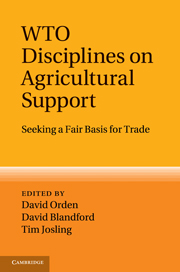Book contents
- Frontmatter
- Contents
- List of figures
- List of tables
- Notes on contributors
- Preface
- List of acronyms
- PART I overview of domestic support issues and WTO rules
- 1 Introduction
- 2 The WTO disciplines on domestic support
- PART II Developed countries: have high levels of support come down?
- PART III Developing countries: will low levels of support rise?
- PART IV Looking forward: can fair markets be achieved?
- Appendix A Domestic support provisions of the Agreement on Agriculture
- Appendix B Domestic support provisions of the Doha draft modalities
- Index
- References
2 - The WTO disciplines on domestic support
Published online by Cambridge University Press: 11 April 2011
- Frontmatter
- Contents
- List of figures
- List of tables
- Notes on contributors
- Preface
- List of acronyms
- PART I overview of domestic support issues and WTO rules
- 1 Introduction
- 2 The WTO disciplines on domestic support
- PART II Developed countries: have high levels of support come down?
- PART III Developing countries: will low levels of support rise?
- PART IV Looking forward: can fair markets be achieved?
- Appendix A Domestic support provisions of the Agreement on Agriculture
- Appendix B Domestic support provisions of the Doha draft modalities
- Index
- References
Summary
Proposals in international trade negotiations to constrain the domestic support that governments can provide to agriculture attract substantial interest for several reasons. Domestic support makes a country produce and trade differently from how it would if it fully pursued its comparative advantages. Domestic support can also shift a country's comparative advantage over time and thus change its trade profile. The interest in domestic support in the Doha negotiations was fuelled by the potential to strengthen the provisions of the WTO's Agreement on Agriculture, the awareness of interested parties of those provisions and of the size and nature of support they allow governments at home and abroad to provide, and by the consideration many governments give to enacting suitable farm policies that meet their international obligations. This chapter examines the framework of WTO domestic support disciplines in agriculture in several dimensions. Why are disciplines on domestic support part of the Agreement, which is, after all, an international trade agreement? What is the nature of the constraints and how are they being applied? In particular, how do the constraints limit diverse measures of policy support differently in developed and developing countries? What additional constraints may result from the Doha negotiations? And how might new multilateral domestic support constraints accommodate or influence the future development of policy support to agriculture on a global scale?
- Type
- Chapter
- Information
- WTO Disciplines on Agricultural SupportSeeking a Fair Basis for Trade, pp. 23 - 58Publisher: Cambridge University PressPrint publication year: 2011
References
- 10
- Cited by



